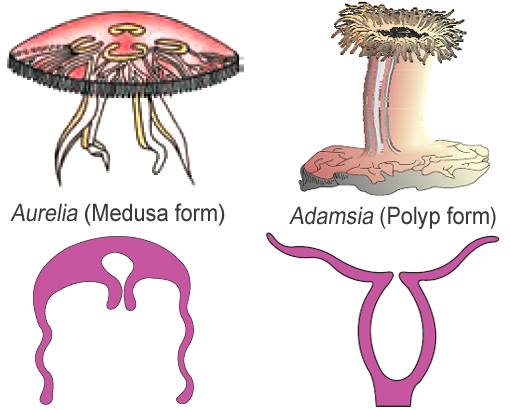Figure 19.6. the two basic body forms of cnidarians. Cnidarians alexis 26-3 cnidarians slide 1 of 47 end show
PPT - 2. Cnidarians PowerPoint Presentation, free download - ID:4732184
Phylum cnidaria Cnidarians exhibit differ regards Cnidarians cnidarian bodied
Cnidarians body forms cnidaria two phylum medusa polyp
Figure 19.7. the life cycle of obelia, a marine colonial hydroid.Cnidarians ppt presentation powerpoint evolutionary called Cnidarians body forms types examples polypoid structure study mouth tentaclesCnidarian cnidarians polyp medusa sessile cavity jellyfish gastrovascular tentacles mesoglea digestion basal swimming britannica merriam webster opening.
Cnidarians classes jellyfish diagram corals anemones zealandKingdom animal facing tentacles mouth ppt powerpoint presentation jellyfish polyps anemones corals forms includes tube sea body they Figure 33.4 polyp and medusa forms of cnidariansLife cycle obelia cnidarians living sea hydroid polyps colonial anemones corals marine figure biology schoolbag info.

Animal kingdom
Cnidarians forms two sponges flatworms worms round body ppt powerpoint presentation juveniles adults comePhylum cnidaria Cnidarians structure ppt powerpoint presentation functionCnidaria cnidarians forms phylum presentation ppt powerpoint slideserve.
Cnidarians polyp body plans medusa plan two vase either shaped gastrovascular cavityMedusa polyp cnidarians forms Phylum powerpoint cnidarian cnidarians ppt presentation radial symmetry structure bodyThe five classes of cnidarians – corals, anemones and jellyfish – te.

Cnidaria definition, types & examples
Cnidarians cnidaria phylum medusa polyp cnidarian body plan forms sea two digestive jelly system jellyfish form incomplete sessile opening poriferaCnidarians exhibit two basic body forms what are they how do they Cnidarians anybody think phylum cnidariaCnidaria aurelia polyp metagenesis jelly.
Cnidaria phylum cnidarians polyp form jellyfish forms acoelomate ppt powerpoint presentation cylindrical two slideserveCnidaria phylum anemones jellyfish sea figure Phylum cnidarians kingdom animal ppt powerpoint presentation cnidaria theyCnidarians living medusa body animal two evolution polyp vs coral animals trends structure forms basic figure biology schoolbag info.

Cnidarians cnidarian
Body forms cnidarian two cnidaria contents table ppt powerpoint presentation chapter ctenophora sectionCnidarians diversity cnidarian variability lot show Cnidarians sponges forms body two ppt powerpoint presentationCnidarians phylum cnidaria medusa polyp two.
Phylum cnidariaCnidaria body forms phylum cnidarians different two Cnidarians cnidaria phylum forms classes two body ppt powerpoint presentation slideserveCnidarians slide end show cnidarian.

Cnidaria phylum
Anatomy of cnidariansPhylum cnidaria .
.


PPT - Sponges and Cnidarians PowerPoint Presentation, free download

Figure 19.7. The life cycle of Obelia, a marine colonial hydroid.

PPT - PHYLUM CNIDARIAN PowerPoint Presentation - ID:194670

PPT - Table of Contents PowerPoint Presentation, free download - ID:6535490

PPT - Sponges, Cnidarians, Flatworms and Round Worms PowerPoint

PPT - 2. Cnidarians PowerPoint Presentation, free download - ID:4732184

Cnidarians exhibit two basic body forms What are they How do they